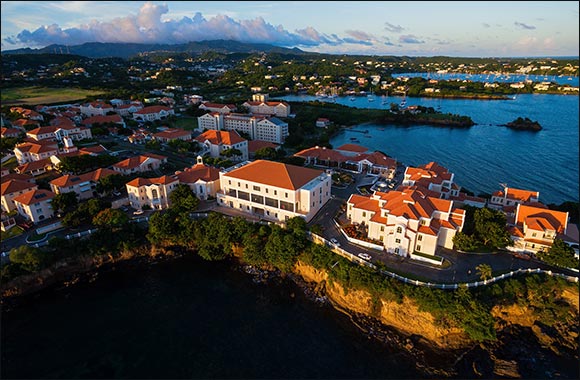
World Cancer Day: What Is Hematology Oncology? A Closer Look at These Cancer Specialists
Leukemia, lymphoma, or myeloma are all types of cancer that can affect the bone marrow, blood cells, lymph nodes, and other parts of the lymphatic system. According to MDPI, Cancer is the third most common cause of death, after heart disease and injuries, and accounted for 10% of all deaths in the UAE in 2019. Leukemia made up 5.7% of the diagnosed cases in 2020. The situation is similar in Saudi Arabia with leukemia patients accounting for 6% of its cancer cases in 2020. An analysis conducted in 2020 showed that Egypt had the largest cancer death rate in the MENA region, with leukemia having one of the highest mortality numbers.
In recognition of the World Cancer Day, led by the Union for International Cancer Control (UICC), St. George’s University’s School of Medicine, Grenada, in the Caribbean, is sharing insights on hematologic oncologists – physicians trained in the diagnosis, treatment, and prevention of blood cancers and blood-related disorders.
Physicians who specialize in this sector of medicine undergo extensive training to become experts in their field. But what exactly is hematology oncology?
What is hematology oncology?
Hematology oncology combines two distinct fields of medicine: Hematology is the study of blood, while oncology is the study of cancer. These can include leukemia (blood cells cancer), multiple myeloma (bone marrow cancer), Non-Hodgkin lymphoma (immune system cancer) and Hodgkin lymphoma (lymphatic cancer).
‘Hematologic malignancies’ differ from other types of cancer because they develop in the body’s blood cells and may not form tumors. Blood is made up of white blood cells, red blood cells, platelets, and plasma. Blood tests can show the presence of too many or too few of any of these components, which a hematologic oncologist can then investigate for signs of blood cancer or other blood disorders.
What does a hematologist oncologist do?
Hematologist oncologists do not perform surgeries on cancers. Rather, they provide medication to treat the condition. This process typically includes running diagnostics – including blood and bone marrow tests, biopsies and imaging examinations – and crafting a treatment plan with a team of other specialists.
Similarly, possible hematology oncology treatment methods include chemotherapy, radiation therapy, blood transfusion, immunotherapy, and bone marrow transplant.
The process of deducing a treatment plan can be impacted by a range of different factors, including the patient’s age, how fast the malignancy is progressing, and where in the body it has spread. Hematologic oncologists will often work in tandem with other specialists, such as surgeons, radiologists, and pathologists. These physicians work primarily in a clinical setting, but they may also spend time in a hospital environment.
How to become a hematologist oncologist
The training to become a hematologist oncologist is fairly rigorous. After graduating from an accredited Doctor of Medicine (MD) program, you’ll need to complete an internal medicine residency, which takes about three years. You’ll then need to participate in a hematology oncology fellowship, which will take another three years.
There are further subspeciality options hematologist oncologists can pursue. In fact, these physicians may opt to specialize in any portion of the body system, such as the lungs, the liver, or even bone and soft tissue.
The journey to becoming a hematologist oncologist can be a challenging one, but nothing compares to the experience of being present during a difficult moment in a patient's life and potentially offering them solutions and life-saving care.
Completing the medical training needed to specialize in hematology oncology is no easy task. But after learning more about this important sector of medicine, you may just be up to the challenge. The most effective way to get started is to seek out a high-quality medical school that can provide you with the education and training you’ll need.
Home >> Events, Entertainment & Exhibitions Section
Grandweld Shipyards to underline maritime innovation at ‘Make It In The Emirates ...
Cyber Square Hosts Region's Premier Student Tech Expo at University of Dubai
Arabian Center to undergo comprehensive refurbishment, charting a new course as ...
You don't have to be on the Beach to Burn
Crown Prince of Abu Dhabi and President of Kazakhstan Witness Masdar Agreement t ...
Hourglass Introduces Veil Hydrating Skin Tint for the ultimate Dewy Glow
World Police Summit Kicks Off Today in Dubai
Emirates Global Aluminium named Sector Partner for Advanced Infrastructure at Ma ...
Dubai Customs empowers Emirati talent through Masar 33 at National Service Caree ...
UAE Cybersecurity Council and e& UAE to launch Al Ain Innovation Centre for emer ...
du launches GPU-as-a-Service to accelerate computing for UAE Government and ente ...
ADIO and ITOCHU forge strategic partnership to accelerate investments into Abu D ...
Gargash Motors Launches AION and HYPTEC in the UAE as it Reimagines Tomorrow's E ...
Dubai Airports' Learning at Work Week building a future-ready workforce, one ses ...
The busiest year for baggage: Emirates' baggage handling success goes from stren ...
CABSAT 2025: France Powers the Future of Broadcasting and Media Innovation
Global Village extends Season 29 for additional seven days, now open until the n ...
RX to launch inter aviation Arabia in Riyadh in February 2026
RTA Completes All Phases of Al Shindagha Corridor Development Project on Bur Dub ...
